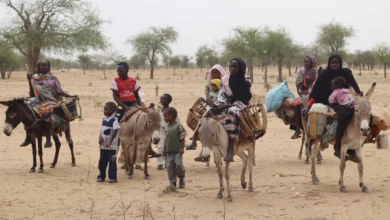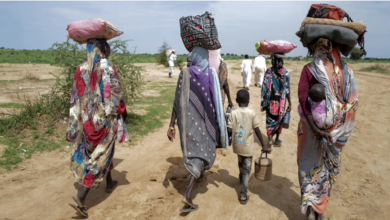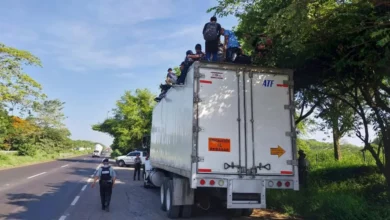Refugees and asylum seekers in Cairo have long complained about poor treatment from the UN’s refugee agency, the United Nations High Commissioner for Refugees (UNHCR), but they may receive more assistance in the near future.
According to a UNHCR representative, the organization as a whole is devoting more resources to urban areas in order that policies tie in with the realities of refugees’ lives. UNHCR Cairo is also expected to increase its budget, which has fallen short of needs in the past.
"We generally budget based on how much we can fund-raise," said Katharina Lumpp, deputy representative for UNHCR Cairo. "Now it’s assessed by needs."
"[The budget for] Egypt comes out at double what we had [previously]. Maybe 30 percent more. It’s a target from a comprehensive needs assessment," she added.
Whether the additional funds will translate to better lives for refugees remains to be seen. In a discussion held at the American University in Cairo with Lumpp, refugee law expert Michael Kagan said that although UNHCR has a better understanding on an organizational level of how refugees survive, current policies on urban areas are not new but rather synthesize what has been done in the past.
Asylum-seekers in Egypt wishing to be granted refugee status must apply through UNHCR, which offers protection, as well as aid through its partner organizations. Egypt is a signatory to two international conventions concerning the rights of refugees: the 1951 Geneva Convention and the 1969 Organization of African Unity Convention. Egypt however made several reservations to the Geneva Convention, which contains more substantive rights for those recognized as refugees. As a result, almost all refugees in Egypt do not have access to public education or health care and UNHCR is the de facto governing body for refugees. This turns UNHCR into what some people call a "surrogate state," operating public services in parallel with the government.
"UNHCR is doing a job that is supposed to be done by the government," said Lumpp.
Kagan said that it is "highly unlikely" that the Egyptian government will take over the responsibilities of UNHCR, such as Refugee Status Determination (RSD). He also said that shifting responsibility for RSD to a government is not always ideal for the refugees themselves, citing the current handover to Israel as an example.
But when UNHCR is compelled to take on so many tasks its resources often become overstretched and refugees become frustrated because their needs are not met.
"Sometimes there are tense situations between refugees and UNHCR, based on unrealistic expectations of refugees as well as UNHCR staff," said Kagan.
Yet in an interview with Abu Bakr Ahmed, a Sudanese refugee from Darfur, the complaints were not only about UNHCR’s inability to provide services, but the way it treats the refugees themselves.
Four years ago, a three-month long peaceful demonstration in a park in front of the Mustafa Mahmoud mosque in Mohandessin ended with at least 20 Sudanese dead. The protest was around the corner from UNHCR Cairo’s office at the time. Following the protest, UNHCR stopped receiving refugee applicants directly at its building. Instead, asylum seekers had to wait in line in public, which Ahmed said made him feel ashamed to ask for help.
Soon thereafter UNHCR moved to a compound in 6th of October City, which has little public transportation and is far from where most refugees live–-and far away from the spotlight.
"They did this for the Egyptian government, not for the refugees," Ahmed said. "It’s upside down."
Ahmed complained that security guards made it difficult for him to access the compound. Once he got in, he faced a UNHCR representative on the other side of a glass wall.
"They treat us like criminals or animals," he said. "We are humans. Let’s sit at a table and talk."
Although UNHCR expects to have more money in Egypt, Lumpp ruled out the possibility of opening small offices or having mobile registration around Cairo to service refugees.
"That would cost even more money," she said.
Becoming a legal refugee and then being resettled in another country is a complicated process. Refugees almost always need an outside organization to help them with their case. Part of the problem is that UNHCR is a large, bureaucratic institution, with units that often do not talk to one another.
"The people who determine RSD [at UNHCR] are not the same people who decide if they can be resettled," said Eva Tache-Green, durable solutions team leader at AMERA, a legal aid NGO for refugees.
Ahmed, who is from the Berti tribe, said that only refugees from the Fur, Zaghawa and Masaleet tribes are being resettled, which he suspects is because most of the Sudanese hired by UNHCR are from these tribes. Al-Masry Al-Youm is however familiar with cases of Sudanese of other tribes who recently traveled to third countries as part of resettlement programs. UNHCR did respond to an email with questions, and Tache-Green confirmed that no such policy exists at UNHCR.
"I can say with confidence that UNHCR does not discriminate based on someone’s ethnicity," she said.
Ahmed said that he fled Darfur because he was arrested and tortured after allowing anti-government activists to use the computers as his office. He cannot return, but is trying to scrape together a life in Cairo. He hopes UNHCR’s additional funding will help him to buy food and pay rent. According to Kagan, UNHCR is at least realizing the importance of the livelihood of refugees living in cities.
"There’s more of an awareness of how refugees survive," he said.




